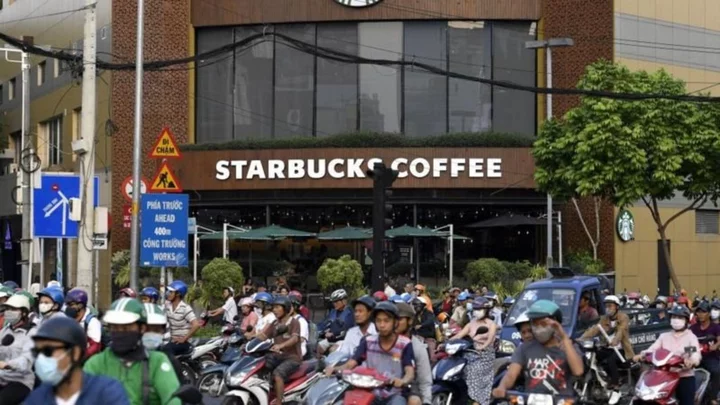Yum China Holdings Inc. which operates KFC, Pizza Hut and Taco Bell restaurants in China, is accelerating store expansion as the business environment becomes more predictable than during the pandemic.
The restaurant chain operator revised up this year’s new store opening target to as many as 1,600, from the previous 1,100 to 1,300, Chief Financial Officer Andy Yeung said in an investor briefing in the northwestern Chinese city Xi’an on Thursday. It plans to build a 20,000-store network in the country by 2026, from about 13,600 from now.
Market conditions are more predictable compared with the past years when strict Covid prevention measures significantly harmed the business, said Chief Executive Officer Joey Wat.
The shares rose 4.8% in Hong Kong Thursday after the company unveiled a target of high-single to double-digit sales growth in the next three years and double-digit earnings per share growth.
Restaurants and catering are among the very few bright spots as consumption becomes sluggish in China, dragged down by weakness in spending on clothes, jewelry and home electronics.
The resilience in fast-food has largely been underpinned by consumers shelling out for instant gratification in a slowing economy and difficult job market. Still, restaurants are not immune to the overall weakness and fast food chains such as those operated by Yum China have being doling out discounts and big promotions to stimulate sales.
Read More: Chinese Cut Back on Cosmetics, Still Spend at Restaurants
That has helped Yum China log strong sales and profit recently. Much of that is credited to the company’s ability to expand marketing campaigns without sacrificing margins, HSBC analysts said. Meanwhile, cost-cutting and efficiency improvements helped protect profitability.
“Consumers are definitely getting more rational with their consumption choice,” Wat said in an interview with Bloomberg TV. “Consumers are focusing more on experience, the sort of experiential consumption. Food and dinging is certainly one of them.”
Chinese people’s interest in traveling beyond major metropolises to lower-tier cities has also been rising, giving the group opportunities to expand its network into smaller towns, she said.
Marketing campaigns such as KFC’s Crazy Thursday, which offers chicken nuggets at 9.9 yuan ($1.36) and a whole chicken at 29.9 yuan, are designed to capture consumers who have been more hesitant to spend amid the economic slowdown. Investment in digitalization and automation will also help improve efficiency and reduce costs, said Wat.
But it remains to be seen how well restaurant operators like Yum can hold up should China’s economic slowdown continue. “The company might be entering a stage during which further margin improvement from cost management is harder to come by,” Angela Hanlee and Michael Halen at Bloomberg Intelligence wrote in August, adding that Chinese consumers are becoming more value-conscious.
Yum China has expanded aggressively into lower-tier cities in recent years, tapping growing demand for western foods such as fried chicken and pizza amid a steady increase in disposable income among small city dwellers.
New restaurants can reach break-even in as little as two years in smaller Chinese cities, just like in the biggest ones, Wat said. Investors generally expect that hotels and restaurants suffer diminished return on investment and longer waits to break-even when opening in smaller cities.
While the current business confidence in the market remains weak, Wat said the large size of China’s middle class offers big enough opportunities for the company to grow in the long term. The company is seeing Chinese consumers are still willing to pay for good food and other interesting experiences amid the economic weakness, while they are more cautious in overall spending.
“Businesses are back to normal now, compared to how helpless we were during the past three years,” said Wat. “We are more agile and capable now.”
--With assistance from Shirley Zhao, Yvonne Man and Michelle Fay Cortez.
(Updates the eighth and ninth paragraphs to add Wat’s comment on Bloomberg TV)









